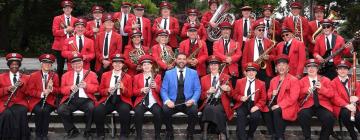Global Opera
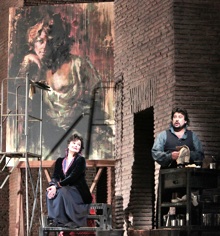 Being part of a full theater in San Francisco's Century-9 complex on Saturday for the Metropolitan Opera's HD (high-definition) simulcast of Puccini's Tosca was not only a musical delight.
Being part of a full theater in San Francisco's Century-9 complex on Saturday for the Metropolitan Opera's HD (high-definition) simulcast of Puccini's Tosca was not only a musical delight. The experience also made us in the audience feel as if we were active citizens of the world: The live transmission went out to more than 1,000 theaters, in 42 countries, on six continents. Including the live audience and listeners to the broadcast, this was a thrilling phenomenon of about a half million people around the world sharing the same opera experience at the same time. (See also Bob Moon's Classical Voice article on opera in movie theaters.)
As in the audience, so on the stage: a Finnish soprano (Karita Mattila in the title role), an Argentine tenor (Marcelo Álvarez as Cavaradossi), and a Georgian baritone (George Gagnidze as Scarpia) excelling in an Italian masterpiece; under the baton of the American Joseph Colaneri, conducting a veritable United Nations of an orchestra.
Most reviews of this (Swiss) Luc Bondy production were correct: vocally and musically magnificent, handicapped by (French) Richard Peduzzi's dark-drab sets and Bondy's occasionally outlandish direction.
I don't know how the simulcast appeared at other venues, of course, but in Century-9 the video and audio were outstanding, with only a minor complaint of interviews in the backstage segments that were too loud (and mostly wooden, notwithstanding Susan Graham's presence — the problem was with the awkward script).
Another small pick: Camera angles allow big-screen close-ups of mouths, all the way down to the pharynx. Shooting from just a few degrees higher may help to avoid these untimely reminders to good dental hygiene.
The good news is that in spite of thoughtful advance notice about the possibility of sunspot interference in North America, "our satellite" of the six being used by the Met for transmission came through well.
Against the stunning success of the "Met HD" program in less than three years since its beginning, how do other similar efforts fare? Not well, I'm afraid. San Francisco Opera's theater videocasts — not live but shown after considerable time and postproduction work — attracted small audiences even here, in the company's own city; elsewhere, attendance was even worse.
SFO General Director David Gockley, among early champions of simulcasts and the man responsible for setting up grand media facilities in the War Memorial, is not likely to give up and we may yet see more SFO productions on screen and/or on DVD, but the combination of the Met HD juggernaut and the economic downturn has cooled off our electronic ardor — for the time being.
And there is also a significant demographic indicator, even more obvious in movie theaters than at live performances: a painful lack of young people in audiences that seem to have a median age of about 70. In spite of Gockley's efforts here and many programs elsewhere, the "aging of opera" seems like a continuing fact of life.
The last time I noticed "fresh blood" was in wake of then-General Director Lotfi Mansouri's 1996 "Broadway La bohème" run at the Orpheum: eight performances a week, low ticket prices, rotating casts of young, talented singers, in an attractive (but not outlandish) production. That worked so much better than all of today's "social networking"-Facebook-Tweeter campaigns.
Why doesn't great opera in movie theaters, at only twice the usual ticket price (and a fraction of those at the War Memorial), attract young audiences? I have no idea, I wish somebody would figure out — and fix — the problem.
Graham There, Graham Here, Graham Everywhere
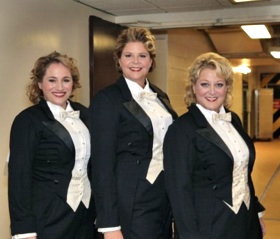
Busy, busy Susan Graham is due "back home" in the Bay Area to head the Philharmonia Baroque's wonderfully cast Dido and Aeneas, the second half of an all-Purcell program titled "The Passion of Dido."
Conducted by Nicholas McGegan, the concerts — Nov. 5-14 in San Francisco, Palo Alto, Berkeley, Los Angeles, and Davis — will also feature sopranos Celine Ricci and Cyndia Sieden, contralto Jill Grove, tenor Brian Thorsett, baritone William Berger, and Bruce Lamott's Philharmonia Chorale.
Besides her participation in the Met HD casts (see top item), Graham has been performing major roles all over, including Marguerite in the Met's La Damnation de Faust. Watch an excerpt from her performance of "D'amour l'ardente flamme," conducted by James Levine.
She will sing Octavian in Der Rosenkavalier, the Met production opening tonight, at 4:30 p.m. PDT, and available for live streaming (also on Sirius).
Flicka Farewell to 'Frisco?
Bewailing in the last issue of Music News the lack of plans to include the Bay Area in Frederica von Stade's farewell tour brought a welcome response. San Francisco Opera Communications Director Jon Finck wrote:
David Gockley is fully aware of this, and he is exploring ideas for a Bay Area farewell concert that would possibly include some of the many arts groups Flicka has been associated with over the past years. I will keep you informed as this develops, but we are hopeful that something will be done. Flicka has a very important and meaningful association with the Opera and we certainly hope to honor that relationship.
Adams Premiere Part of DudamelMania in L.A.
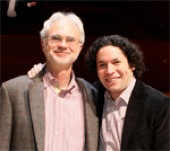
John Adams has launched his role as creative chair of the Los Angeles Philharmonic with the world premiere of City Noir, written for Gustavo Dudamel's inaugural concert on Oct. 8. (See Jeff Dunn's Classical Voice review.)
"Creative Chair" is likely to be a combination of "resident composer" and "music advisor." City Noir is Adams' largest orchestral work to date, the standard orchestra fortified with six horns, two harps, five percussionists, and one jazz drummer.
It is, Adams says, "a symphony inspired by the peculiar ambience and mood of Los Angeles noir films, especially those produced in the late '40s and early '50s. My music is an homage not necessarily to the film music of that period but rather to the overall aesthetic of the era. This symphony becomes the third in a triptych of orchestral works that have as their theme the California experience, its landscape and its culture. The two previous are The Dharma at Big Sur (also commissioned by the Los Angeles Philharmonic) and El Dorado (commissioned by the San Francisco Symphony)."
Dudamel's opening night gala concluded with Mahler's First Symphony. The concert will be telecast on PBS Great Performances on Oct. 21.
Dudamel's first subscription series, Oct. 9-11, added to the Mahler the Kent Nagano-championed Unsuk Chin's concerto Su. Listen to an excerpt from the world premiere with the Tokyo Symphony Orchestra.
West Bay Bohème
General Director José Luis Moscovich will yield the baton to guest conductor Bryan Nies to open West Bay Opera's 54th season with Puccini's La bohème, Oct. 16-25, at the Lucie Stern Theater, Palo Alto.
The cast includes Carrie Hennessey (Mimi), Ani Maldjian (Musetta), Pedro Betancourt (Rodolfo), David Hodgson (Marcello), and John Bischoff (Colline).
Plenty of Russian Music, Free
Next in the free series of American Philharmonic-Sonoma County, on Oct. 17-18, a From Russia with Love concert, at the Santa Rosa Wells Fargo Center for the Arts.
Led by guest conductor John Kendall Bailey, the generous program includes Shostakovich's Festive Overture, the original 1920 version of Stravinsky's Symphonies of Wind Instruments, a Rachmaninov Vocalise, Rimsky-Korsakov's Capriccio Espagnol, the "Polovetsian Dances" from Borodin's Prince Igor, and the 1919 version of Stravinsky's Firebird Suite.
Amelia Goes to Seattle
Daron Aric Hagen's Amelia will have its world premiere next summer at the Seattle Opera.
With libretto by Gardner McFall from director Stephen Wadsworth's story, Amelia takes place over a 30-year period beginning in 1966. A first time mother-to-be, memories of the Vietnam War, and elements of the Daedalus and Icarus myth are interwoven in the opera. Kate Lindsey sings the title role; the cast includes Nathan Gunn, Jennifer Zetland, Jordan Bisch, and Jane Eaglen.
Just in Time for Halloween
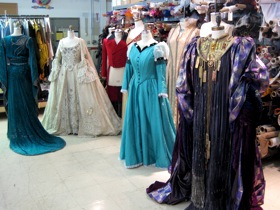
The fourth San Francisco Opera Costume Shop sale will take place Oct. 24-25 at the Opera's Scene Shop at 800 Indiana Street (between 20th and 22nd Streets). On sale are hundreds of items, including hats, masks, fabrics and shoes, as well as handmade costumes spanning a wide variety of styles and periods, for men, women, and children.
In addition to medieval, biblical, Renaissance, and 18th-century costumes, modern and vintage clothing previously worn in San Francisco Opera productions are also available, as well as conceptual and fantasy costumes that the announcement says "defy description."
Examples: hand-painted kimonos from Madama Butterfly, photo emulsion-printed costumes from Macbeth, costumes from Manon and The Force of Destiny. The sale includes a special collection of costumes worn by such luminaries as Montserrat Caballé, Beverly Sills, Leontyne Price, Luciano Pavarotti, Régine Crespin, Plácido Domingo, Renée Fleming, Thomas Hampson, Mirella Freni, Samuel Ramey, and Joan Sutherland.
S.F. Lyric Opera Suspends Operations
From Last Week's late edition of Music News
San Francisco Lyric Opera Artistic Director Barnaby Palmer announced on Thursday that the company is suspending operations, effective immediately, because of lack of
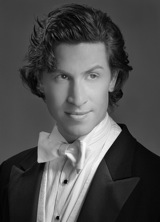
funds. The first casualty of the decision is the planned production of an opera gala next month, itself a fund-raising event.
For the past eight years, Lyric Opera created a niche for itself with much praised, low-priced productions of 25 fully staged works, first at the Legion of Honor and lately in Cowell Theater. A special mission of the company was to attract young people to opera, admitting children for free.
Palmer's announcement includes a plea for support so that the company may regroup by 2011 by "recruiting a slate of new, active board members, to obtain funding commitments from new donors and to seek out a leader."
Always a low-budget organization, Lyric Opera is looking for funding of $500,000 to enable it to budget for 16 performances of four operas annually.
